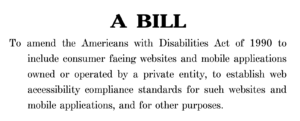
Dante’s hell was a complicated place, as this map by Botticelli suggests. Although Rodney Atkins’ advice “if you’re going through hell, keep on going” appears sound, winding through all the complexities of the ADA and FHA can seem like descending through all nine levels of hell. Nonetheless, I’m happy to act on a temporary basis as Virgil and see how far we can get. No promise about whether we’ll find a Beatrice to take you to Paradise. More


 The ADA and FHA decisions handed down in the last few weeks share a common theme: technicalities matter. Sometimes the lack of technical standards increases the time and money spent in litigation, as in the first entry below, but more often technical matters of procedure and expert testimony determine the outcome of a case. The ancient Greek dramatist Aeschylus famously said “wrong must not win by technicalities,” but it is easier to sort out right and wrong when you get to write the play and decide who says and does what. When people don’t agree they go to court, and a commitment to the rule of law is a commitment to deciding disputes based on technicalities instead of fluctuating political and individual notions of what is right and wrong.
The ADA and FHA decisions handed down in the last few weeks share a common theme: technicalities matter. Sometimes the lack of technical standards increases the time and money spent in litigation, as in the first entry below, but more often technical matters of procedure and expert testimony determine the outcome of a case. The ancient Greek dramatist Aeschylus famously said “wrong must not win by technicalities,” but it is easier to sort out right and wrong when you get to write the play and decide who says and does what. When people don’t agree they go to court, and a commitment to the rule of law is a commitment to deciding disputes based on technicalities instead of fluctuating political and individual notions of what is right and wrong.  On October 2, while the news covered President Trump’s admission to Walter Reed for treatment of Covid-19, Congressmen Lou Correa (D-CA) and Ted Budd (R-NC) introduced the bipartisan Online Accessibility Act, which they claim will “increase website accessibility and reduce predatory lawsuits filed against businesses.”¹ Will it work? That’s a reasonable question.
On October 2, while the news covered President Trump’s admission to Walter Reed for treatment of Covid-19, Congressmen Lou Correa (D-CA) and Ted Budd (R-NC) introduced the bipartisan Online Accessibility Act, which they claim will “increase website accessibility and reduce predatory lawsuits filed against businesses.”¹ Will it work? That’s a reasonable question. I’ve observed before that titles II and III of the ADA create what can be called a crime looking for a victim.* The decision in Hamer v. City of Trinidad, 2019 WL 2120132 (10th Cir. May 15, 2019) shows how defining the crime can change the burden cities may face today based on decisions that go back decades or even centuries. The decision in Hamer will allow almost any person with a disability to demand that every inaccessible facility of a town like Trinidad be fixed regardless of its historical origin and regardless of how long the plaintiff has known of the problem. This decision contradicts decisions from other Circuits and follows a dubious analytical path. (For those who want a different view on this case, William Goren’s blog
I’ve observed before that titles II and III of the ADA create what can be called a crime looking for a victim.* The decision in Hamer v. City of Trinidad, 2019 WL 2120132 (10th Cir. May 15, 2019) shows how defining the crime can change the burden cities may face today based on decisions that go back decades or even centuries. The decision in Hamer will allow almost any person with a disability to demand that every inaccessible facility of a town like Trinidad be fixed regardless of its historical origin and regardless of how long the plaintiff has known of the problem. This decision contradicts decisions from other Circuits and follows a dubious analytical path. (For those who want a different view on this case, William Goren’s blog 